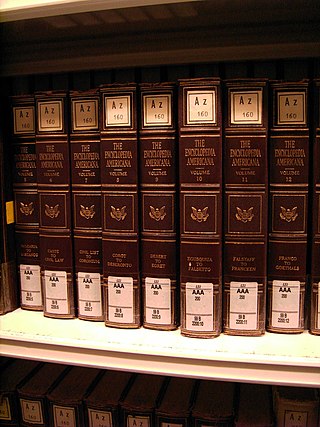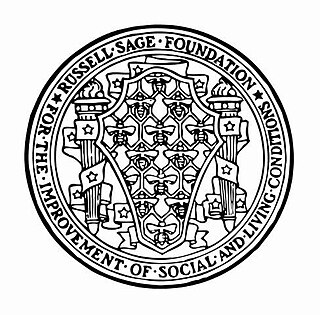The Encyclopaedia of the Social Sciences is a specialized fifteen-volume Encyclopedia first published in 1930 and last published in 1967. It was envisaged in the 1920s by scholars working in disciplines which increasingly were coming to be known as "human sciences" or "social sciences". The goal was to create a comprehensive synthesis of the study of human affairs as undertaken by practitioners of all fields involved in such study. The parameters of what would come to be known as "social science" were in many ways initially established and defined by this publication.
The Encyclopaedia's founding organizations included the American Anthropological Association, the American Association of Social Workers, the American Economic Association, the American Historical Association, the American Political Science Association, the American Psychological Association, the American Sociological Society, the American Statistical Association, the Association of American Law Schools, and the National Education Association. It was edited by American economists Edwin Robert Anderson Seligman and Alvin Saunders Johnson. Seligman and Johnson solicited contributions from many of the most known and respected scholars in their fields, and established many links with European scholars in the process. The Rockefeller Foundation, Carnegie Foundation, and Russell Sage Foundation provided initial financial support, and Macmillan was selected as publisher. [1] [2] [3]
The international network of social scientists developed in the process of creating the Encyclopaedia would prove especially important during the Nazi occupation of Europe, during which many contributing scholars fled persecution for their ideas. Under Johnson's invitation, several of these scholars would come to New York City and form the "University in Exile", a specialized graduate school now known as the New School for Social Research. [4] [5]
The Encyclopaedia was last printed in 1967, then in its 16th edition. It was succeeded by the International Encyclopedia of the Social Sciences, edited by David L. Sills, and also published by Macmillan. [1]

Social science is one of the branches of science, devoted to the study of societies and the relationships among individuals within those societies. The term was formerly used to refer to the field of sociology, the original "science of society", established in the 19th century. In addition to sociology, it now encompasses a wide array of academic disciplines, including anthropology, archaeology, economics, human geography, linguistics, management science, communication science and political science.

Encyclopedia Americana is a general encyclopedia written in American English. It was the first major multivolume encyclopedia that was published in the United States. With Collier's Encyclopedia and Encyclopædia Britannica, Encyclopedia Americana became one of the three major English-language general encyclopedias: The three were sometimes collectively called "the ABCs". Following the acquisition of Grolier in 2000, the encyclopedia has been produced by Scholastic.

The Encyclopaedia Judaica is a 22-volume English-language encyclopedia of the Jewish people, Judaism, and Israel. It covers diverse areas of the Jewish world and civilization, including Jewish history of all eras, culture, holidays, language, scripture, and religious teachings. As of 2010, it had been published in two editions accompanied by a few revisions.
Encyclopædia Iranica is a project whose goal is to create a comprehensive and authoritative English language encyclopedia about the history, culture, and civilization of Iranian peoples from prehistory to modern times.

Edwin Robert Anderson Seligman (1861–1939), was an American economist who spent his entire academic career at Columbia University in New York City. Seligman is best remembered for his pioneering work involving taxation and public finance. His principles for a progressive federal income tax were adopted by Congress after the passage of the Sixteenth Amendment. A prolific scholar and teacher, his students had great influence on the fiscal architecture of postcolonial nations. He served as an influential founding member of the American Economics Association.
The International Encyclopedia of the Social Sciences was first published in 1968 and was edited by David L. Sills and Robert K. Merton. It contains seventeen volumes and thousands of entries written by scholars around the world. The 2nd edition is composed entirely of new articles. It was published in 2008 and edited by William A. Darity Jr., an American economist.

Edward Franklin Frazier, was an American sociologist and author, publishing as E. Franklin Frazier. His 1932 Ph.D. dissertation was published as a book titled The Negro Family in the United States (1939); it analyzed the historical forces that influenced the development of the African-American family from the time of slavery to the mid-1930s. The book was awarded the 1940 Anisfield-Wolf Book Award for the most significant work in the field of race relations. It was among the first sociological works on blacks researched and written by a black person.

The Russell Sage Foundation is an American non-profit organisation established by Margaret Olivia Sage in 1907 for “the improvement of social and living conditions in the United States.” It was named after her recently deceased husband, railroad executive Russell Sage. The foundation dedicates itself to strengthening the methods, data, and theoretical core of the social sciences in order to better understand societal problems and develop informed responses. It supports visiting scholars in residence and publishes books and a journal under its own imprint. It also funds researchers at other institutions and supports programs intended to develop new generations of social scientists. The foundation focuses on labor markets, immigration and ethnicity, and social inequality in the United States, as well as behavioral economics.
The New School for Social Research (NSSR) is a graduate-level educational institution that is one of the divisions of The New School in New York City, United States. The university was founded in 1919 as a home for progressive era thinkers. NSSR explores and promotes what they describe as global peace and global justice. It enrolls more than 1,000 students from all regions of the United States and from more than 70 countries.
Alvin Saunders Johnson was an American economist and a co-founder and first director of The New School.
Kingsley Davis was an internationally recognized American sociologist and demographer. He was identified by the American Philosophical Society as one of the most outstanding social scientists of the twentieth century, and was a Hoover Institution senior research fellow.
Helen V. Milner is an American political scientist and the B. C. Forbes Professor of Public Affairs at the Woodrow Wilson School of Public and International Affairs at Princeton University, where she is also the Director of the Niehaus Center for Globalization and Governance. She has written extensively on issues related to international political economy like international trade, the connections between domestic politics and foreign policy, globalization and regionalism, and the relationship between democracy and trade policy.

David E. Bloom is an American author, professor, economist, and demographer. He is Professor of Economics and Demography at the Harvard School of Public Health, and director of the Program on the Global Demography of Aging. He is widely considered as one of the greatest multidisciplinary social science researchers of the world.
Jack A. Goldstone is an American sociologist, political scientist, and historian, specializing in studies of social movements, revolutions, political demography, and the 'Rise of the West' in world history. He is an author or editor of 13 books and over 150 research articles. He is recognized as one of the leading authorities on the study of revolutions and long-term social change. His work has made foundational contributions to the fields of cliodynamics, economic history and political demography. He was the first scholar to describe in detail and document the long-term cyclical relationship between global population cycles and cycles of political rebellion and revolution. He was also a core member of the "California school" in world history, which replaced the standard view of a dynamic West and stagnant East with a ‘late divergence’ model in which Eastern and Western civilizations underwent similar political and economic cycles until the 18th century, when Europe achieved the technical breakthroughs of industrialization. He is also one of the founding fathers of the emerging field of political demography, studying the impact of local, regional, and global population trends on international security and national politics.
Barbara Stoler Miller was a scholar of Sanskrit literature. Her translation of the Bhagavad Gita was extremely successful and she helped popularize Indian literature in the U.S. She was the president of the Association for Asian Studies in 1990.
Various aspects of communication have been the subject of study since ancient times, and the approach eventually developed into the academic discipline known today as communication studies.
Ainslie Thomas Embree was a Canadian Indologist and historian. He was considered a leading scholar of modern Indian history and played a seminal role in the introduction of South Asian studies into US college and secondary education curricula. In addition to his academic work, Embree made significant contributions to peace efforts between India and Pakistan as a member of the Kashmir Study Group and the Council on Foreign Relations, and acted as a consultant to the US diplomatic and intelligence communities. He has been described as a "tireless advocate for greater understanding between the US and India" who was also known for his seminal insights into the complex relationship of religion and nationalism that have influenced religious scholarship in this country.

David Francis Germano is an American Tibetologist and Professor of Tibetan and Buddhist Studies at the University of Virginia (UVa), the largest Tibetan Studies program in the Americas, where he has taught and researched since 1992. With dual appointments in the School of Nursing and the Department of Religious Studies, Germano currently oversees the work of over twenty graduate students. He is on the board of the International Association of Tibetan Studies and is Editor-in-Chief of The Journal of the International Association of Tibetan Studies (JIATS), a leading journal of Tibetology. In 2000, he founded the Tibetan and Himalayan Library, a digital initiative for collaborative building of knowledge on the region, which he continues to lead as Director. Since 2008 he has also been the co-director of the UVa Tibet Center. More recently, Germano acted as the founding director of SHANTI at the UVa. Since 2011, Germano has also played a leading role in organizing the University of Virginia's Contemplative Sciences Center, which he currently directs.
Jo Carol Phelan is a Special Research Scientist in the Department of Sociomedical Sciences and Co-Director of the Center for the Study of Social Inequalities and Health at Columbia University's Mailman School of Public Health. She is known for working with Bruce Link to develop the theory of fundamental causes of social inequalities in health. She was a Russell Sage Foundation Visiting Scholar from 2012 to 2013. She also received a Health Policy Investigator Award from the Robert Wood Johnson Foundation in 1996, and the 1999 book Handbook of the Sociology of Mental Health, which she co-edited, received the prize for best publication from the American Sociological Association's Section of the Sociology of Mental Health.








